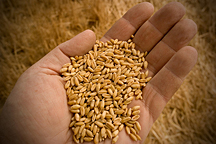- Number 324 |
- November 8, 2010
Agricultural improvements aid in reducing emissions, saving forests

Improving crop productivity and
limiting carbon emissions through
economic incentives could halt
tropical deforestation over the next
century, according to this study.
Photo credit: Scott Butner
Improving crop productivity and limiting carbon emissions through economic incentives could halt tropical deforestation over the next 100 years, according to a study from the University of New Hampshire and the Joint Global Change Research Institute, a partnership between Pacific Northwest National Laboratory and the University of Maryland. Global demands for food, fiber, and other earth-grown resources are driving deforestation. Changing land use from forests to croplands increases carbon emissions. Reducing deforestation would buy society time to make needed long-term changes to how we produce and consume energy. Previous climate studies have shown the value of accounting for forest to farmland conversions. However, this new study is the first to demonstrate the contribution of agricultural technology as a climate mitigation strategy — in terms of how much it can contribute to reducing carbon emissions from land use change. This study was recently published in the Proceedings of the National Academy of Sciences Early Edition.
[Kristin Manke, 509.372.6011,
kristin.manke@pnl.gov]
